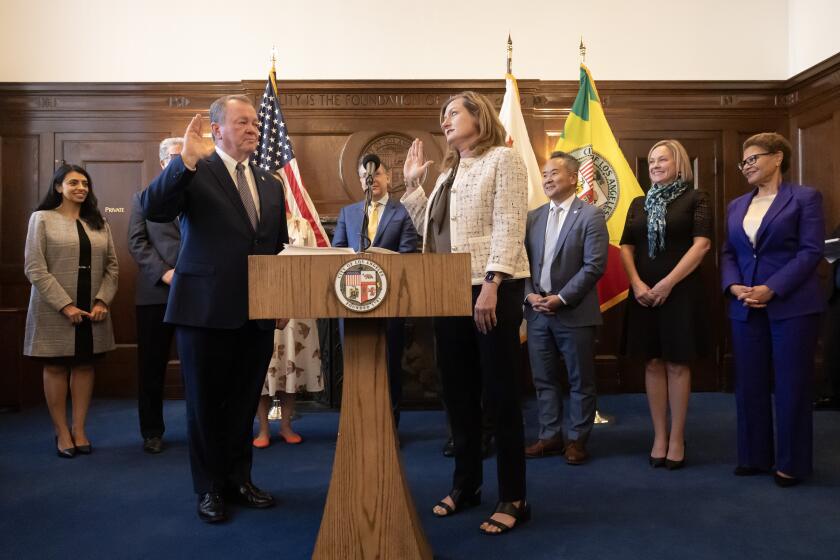On Friday, Jim McDonnell was confirmed as the 59th police chief of Los Angeles in an 11-2 vote by the City Council, signaling a significant leadership change for the LAPD. The vote, while largely supportive, highlighted ongoing concerns about McDonnell’s past actions regarding immigration enforcement, particularly against a backdrop of heightened scrutiny and the return of Donald Trump to the presidency. Following the confirmation, McDonnell made it clear that his department would not assist in federal immigration enforcement efforts, asserting, “LAPD will not assist with mass deportations.” His promise to protect all residents of Los Angeles, particularly immigrants, was a crucial element of his address to the council, and it underscored his commitment to fostering trust within the diverse communities he serves.
The appointment of McDonnell has drawn mixed reactions, reflecting the divided sentiments within the city council and the community at large. While several council members praised Mayor Karen Bass for her choice, noting McDonnell’s extensive law enforcement experience, dissenting votes from councilmembers Eunisses Hernandez and Hugo Soto-Martínez illustrated the apprehension stemming from the new chief’s previous record. McDonnell served as Los Angeles County sheriff from 2014 to 2018 and allowed immigration authorities access to the county’s jail system during his tenure. This decision has been criticized for contributing to family separations and instilling fear within immigrant communities, as many were subjected to deportation processes under federal oversight.
Responding to concerns about his previous policies, McDonnell claimed he has evolved in his perspectives since his sheriffs’ tenure. He cited a significant decrease in the number of individuals released to immigration authorities, claiming that the number dropped from over 7,800 in 2013 to just 820 by the end of his term. He also highlighted the increase in the department’s sponsorship of U-visas, which protect immigrant crime victims, as part of his progress in fostering trust between law enforcement and immigrant communities. Nevertheless, the council’s split vote for McDonnell is a departure from previous unanimous confirmations for LAPD chiefs, indicating persistent doubts regarding his immigration stance and the implications for community relations.
The public’s reaction to McDonnell’s confirmation was also sharply divided. Hundreds of activists rallied outside City Hall, demanding that Los Angeles adopt a truly “sanctuary city” policy. Protesters claimed that McDonnell’s history reflected an alignment with anti-immigrant sentiments, thereby eroding community trust in law enforcement. In a passionate assembly characterized by a mix of support and opposition, residents voiced their concerns and hopes regarding McDonnell’s leadership. Activists like Pablo Alvarado from the National Day Laborer Organizing Network articulated strong distrust toward McDonnell, arguing that his past actions had already betrayed the communities of color he’s meant to protect.
Amidst public scrutiny, McDonnell addressed questions about potential cooperation with Trump’s immigration policies during a press conference. He refuted any notion that the LAPD would engage in mass deportation efforts, emphasizing that such actions would alienate significant portions of the population and undermine public safety efforts. “We’re here to keep everybody safe in all communities,” he stated, emphasizing that community trust was essential for effective policing. His responses suggest a clear intention to redefine the LAPD’s relationship with immigrant communities, yet skepticism remains prevalent, particularly given his previous administrative choices.
The overall narrative surrounding McDonnell’s appointment casts a spotlight on the intersection of law enforcement, immigration policy, and community trust in Los Angeles. The mixed approval from the council, the passionate public opinions expressed at rallies, and the historical context of McDonnell’s record reveal the challenges he faces in leading a department that is expected to serve and protect an increasingly diverse population while navigating complex feelings about immigration enforcement. Although the new chief has articulated a commitment to safeguarding all city residents, the road ahead may require sustained efforts to rebuild trust and align policing practices with the values of inclusion and justice for everyone in Los Angeles.
In conclusion, McDonnell’s confirmation marks a pivotal moment in Los Angeles law enforcement amid an era of intense scrutiny regarding the treatment of immigrants. His public remarks signal a divergence from past policies but also face the challenge of being perceived as genuine amid skepticism from activists and community leaders. Moving forward, his ability to foster trust and navigate the entrenched fears surrounding immigration enforcement will be decisive in shaping the department’s future and its relationship with the city’s many communities. As McDonnell prepares for his formal swearing-in ceremony, the broader actions and policies he implements will ultimately determine how effectively he can unite a divided city under the banner of safety and well-being for all residents.

